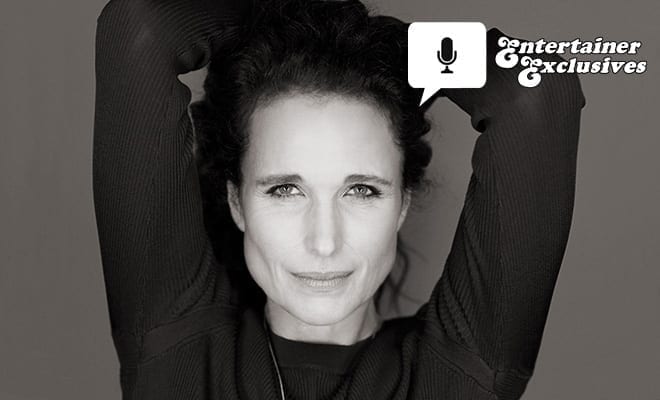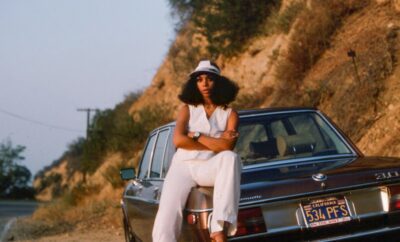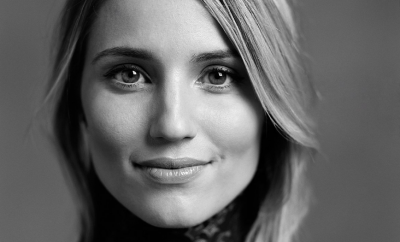 Courtesy of Sam Jones
Courtesy of Sam Jones
Movies
Entertainer Exclusive Part 2: Andie MacDowell on Womanhood, Spirituality and Love After Love
If you haven’t read Part 1: Andie MacDowell on Womanhood, Spirituality and Love After Love, click here!
Actress Andie MacDowell’s appeal is in her ethereal glow. From her crown of dark cascading curls to her porcelain complexion and delicate features, MacDowell’s sweet yet sultry sensuality captivated movie-going audiences with hits like Sex, Lies, and Videotape, Green Card, Groundhog’s Day and Four Weddings and a Funeral. She has always played the woman of great desire who orbits just outside of the male lead’s reach… that is, until he figures out how to win her over.
As Andie tells it, her “it girl” status throughout the late eighties and the whole of the nineties was a thrill ride, but left her feeling torn between an A-List movie career and being a hands-on mother to her three children. It was then she resolved to stop making movies back-to-back, but to choose her projects more carefully, kicking the tires first to be sure the role was worth time away from her family.
Over the last eighteen years, MacDowell has continued to work steadily, choosing roles that move her, make her think, and those that allow her to unpack her more provocative side. In 2015’s Magic Mike XXL, MacDowell played Nancy, the flirtatious older woman who unapologetically has her way with Joe Manganiello’s character. It’s safe to say that at this stage in MacDowell’s career she is doing anything but playing it safe on screen.
In her latest film, Love After Love, MacDowell tackles the role of the beautifully confident Suzanne, a wife and mother of two grown sons (played by Chris O’Dowd and James Adomian). She is loving her life (including her sex life) until her husband’s declining health and his death leaves her and her family reeling with grief, bitterness, and fear, as they try to regain their equilibrium.
We sat down for a frank discussion about growing older in Hollywood, embracing each stage of life, the #MeToo movement, finding her spiritual center and the enigmatic definition of happiness.
AK: In the early years of your career, did you ever have a #MeToo moment?
AM: I didn’t ever have sexual problems in the context of my career. I never found myself in any kind of position in this business. I had #MeToo issues, but not in the business. But for me, what I find as relevant and equally as important as the #MeToo movement regarding sexual assault I strongly believe that this is the first time we have had any voice. Women have always been accused of being too emotional. If you’ve studied therapy, early on, according to Carl Jung, a woman who wanted to be independent was crazy. That’s how far we have had to come. Just to be independent, not too long ago, we were called insane. There are so many social issues right now that are really important. My hope is that every aspect of how we have been diminished is going to be opened up. People will see and question why they would have to ask a woman the question that they asked me when I turned forty, yet not ask it of a man. It’s important that we take a hard look at that. That cannot be overlooked if we are to finally be seen as equal human beings on this planet.
AK: With Love After Love you did find a role that shows the complexity of a female character.
AM: I am astounded by this film and this role. And Chris O’Dowd is a great person and very talented actor. I was surrounded by remarkable people.
AK: Was there a lot of improvisation in this film?
AM: There was a good bit of improv. But with the script, I love the words that [filmmaker] Russell Harbaugh wrote for me. They are not words that I would come up with, so I liked using his words and speaking the way that he wrote her. I’ll tell you what is improved, is the very first scene at the opening of the film, that was improved, the line “Your dad’s pretty good in bed.” That whole thing was improv. There is something really fresh when you do improv because it surprises you. That being said, almost everything else in the script was written and it’s somebody else’s intelligent words being given to me.
AK: The question in that first scene that’s asked to your character is, “What is happy?”
AM: That was an honest answer that my character gives, “You can’t always be happy.” A therapist told me that one time (laughs). It was a big revelation; you can’t always be happy.
AK: How do you define happy? What does happy mean for you?
AM: I think happiness is peace of mind. It’s definitely not superficial. Happiness is not a big house. I’ve had a big house and I’ve had a small house, and I think I was happier in the smaller house. Happiness is never going to be things. It’s also love and attachment, but to me happiness is really peace of mind.
AK: What do you believe in, and who or what do you pray to?
AM: Ha! I pray to a very liberal Jesus. I grew up going to church and it was a warm environment where my mother played the organ and my favorite song was Jesus Loves the Little Children. It’s such a corny little song, but I love it. “All the children of the world; black and yellow, red and white; they’re all precious in His sight; Jesus loves the little children of the world.” I grew up going to Sunday school and sang that song, and it was sweet. It’s nothing to do with politics or any concept that everybody has unfortunately thrown onto my concept of who He is. My belief is in kindness. I’ve also read a lot on Buddhism and I’m a Yogi, and I don’t like the concept of what people have of what the church is nowadays. The whole political thing has ruined it.
AK: I love the saying, “Instead of being Christian, be Christ-like.” So much of the judgment that people spew is so interesting to me, because Jesus was a liberal in terms of His lack of judgment on His fellow man.
AM: He was definitely a liberal. He loved the poor people. And He would go into the church and knock over things. He couldn’t stand that kind of behavior. The way my family observed [Christianity] was very sweet. There are so many positive aspects to it. There’s a lot of negative aspects to it too. But if you just sit down at a table, and everybody gets together and holds hands and simply says, “Thank you for the food.” I want to tell people that I’m the good kind, I’m not the ugly kind.
AK: “I’m not here to judge you. I have no interest in judging you.”
AM: Right! I’m not here to judge you. Oh, my heavens! And I don’t think about heaven or hell. I think heaven and hell is right here. You can make the world heaven or hell.
AK: Earth is a yin and yang experience. You have dark and light, night and day, good and evil, joy and sorrow. That’s all right here. Speaking of which, what do you see as the moral of the story in this movie, Love After Love? What’s the takeaway from this movie?
AM: That we’re broken. Everybody, all of us. I think we’re all broken and we’re just trying to get through life as best as we can.
AK: I feel like there should be a “but” there. We’re all broken, but…
AM: But, we’ll get through it together. We need each other and nobody’s perfect.
AK: How are you going to ring in your sixtieth birthday next month?
AM: I’m going to be working which is what I like to do! That’s a good thing. I want to do something special. Maybe I’ll go to India. I’ve been wanting to go to India for a long time.
AK: What do you think this new decade will bring into your life?
AM: I know what I hope it brings. I would like to do more spiritual work. Go listen to Ram Dass talk, and Marianne Williamson; go to a yoga retreat and cultivate every aspect of myself so that I can continue to work on peace of mind. As you get older, I feel like if you’re going down the right road there is this clarity that you can see in your eyes. It’s a gentleness that is the most beautiful aspect a human can have. That is my goal, to continue to work on that gentle side of myself.
AK: The title of this film, Love After Love, I feel like it holds a double meaning. Does it mean finding your life after losing love, or finding love again after losing love, or both?
AM: For me it means that love is a complex thing. You can’t fit it all in one place. In this film, it could mean that maybe we all loved him so much that we needed to learn to love in another way. If you don’t have a person in your life any longer, then you have to find your way to loving other people.
Love After Love is now available on iTunes.





0 comments